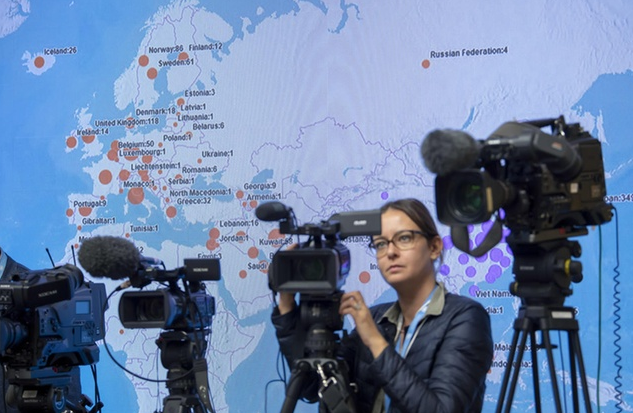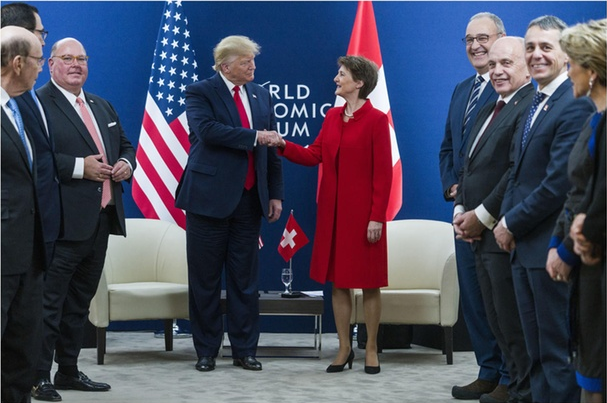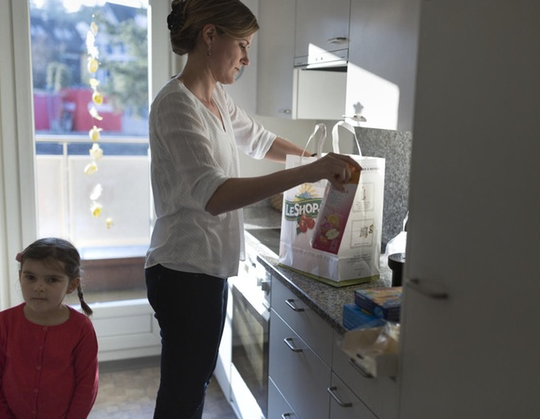A journalist attends a Covid-19 briefing at the World Health Organization (WHO) in Geneva on March 6. WHO has played a leading role in fighting the virus, amid criticism. (Martial Trezzini/Keystone) The pandemic is testing the limits of the United Nations system, say Geneva and New York-based experts, amid funding challenges and an ongoing blame game between the United States and China. The UN is marking its 75th anniversaryexternal link this year. What could have been a year of celebration is becoming a year of crisis. Antonio Guterres, its secretary-general, called the pandemic “the most challenging crisis the UN has faced since the Second World War”. The Geneva-based World Health Organization (WHO) has played a leading role in fighting the virus, amid
Topics:
Swissinfo considers the following as important: 3.) Swiss Info, 3) Swiss Markets and News, Featured, newsletter, Politics
This could be interesting, too:
Investec writes The Swiss houses that must be demolished
Claudio Grass writes The Case Against Fordism
Nachrichten Ticker - www.finanzen.ch writes Die Performance der Kryptowährungen in KW 9: Das hat sich bei Bitcoin, Ether & Co. getan
Nachrichten Ticker - www.finanzen.ch writes Wer verbirgt sich hinter der Ethereum-Technologie?

A journalist attends a Covid-19 briefing at the World Health Organization (WHO) in Geneva on March 6. WHO has played a leading role in fighting the virus, amid criticism. (Martial Trezzini/Keystone)
The pandemic is testing the limits of the United Nations system, say Geneva and New York-based experts, amid funding challenges and an ongoing blame game between the United States and China.
The UN is marking its 75th anniversaryexternal link this year. What could have been a year of celebration is becoming a year of crisis. Antonio Guterres, its secretary-general, called the pandemic “the most challenging crisis the UN has faced since the Second World War”.
The Geneva-based World Health Organization (WHO) has played a leading role in fighting the virus, amid criticism, most recently by the Trump administration of its response to the pandemic and position towards China. Other UN agencies and international organisations have also scrambled to respond under lockdowns.
So far, member states’ responses to the pandemic have been largely unilateral and the UN Security Council has been conspicuously silent. It met by video conference for the first time on April 9 and afterwards merely issued a statement expressing support for Guterres’ efforts and a need for unity.
In separate interviews, Richard Gowanexternal link, who oversees the International Crisis Group’s advocacy work at the United Nations in New York, and Thomas Bierstekerexternal link, a professor of international relations and political science at the Geneva Graduate Institute, share their perspectives on what’s at stake in the UN response to the pandemic.
swissinfo.ch: Is this pandemic really a “moment of truthexternal link” for the UN and multilateral system, as Guterres has hinted?
Richard Gowan: This is a decisive test for the UN’s relevance in the 21st century. If the UN’s member states ultimately succeed in working together to contain the disease, and if UN agencies can play a significant role in coordinating the fight, it will show why multilateralism matters. This is especially important for weak and poor countries, which are likely to need a lot of technical and economic assistance to manage the fallout from Covid-19. If, however, governments fail to coordinate and pursue a fragmented, nationalist approach to limit the disease’s spread, many will conclude that the UN is no longer relevant. This could have negative consequences for coordination on issues from climate change to human rights.
Thomas Biersteker: The initial reaction of most countries seems to be to close the border and not to refer to the multilateral system. At one level, this is not surprising. Multilateralism is definitely facing a moment of truth, but it’s too soon to say what the implications are. I think the longer we experience the consequences of these uncoordinated moves, the more we’ll realise the limitations of acting at the national level alone.
swissinfo.ch: How do you explain the Security Council’s inaction over the pandemic?
R.G.: The majority of Security Council members want to act on the crisis, although it is important to recognise that the Council cannot and should not try to replace the WHO in directing international health interventions. But at a minimum, the Council should be dealing with the pandemic’s likely impact on stability and security in regions like Africa and the Middle East, in line with the Secretary-General’s call for a global ceasefire. The main reason it has failed to act is tension between China and the US. The Americans have insisted that any Council resolution on the disease should explicitly reference its origins in China, which Beijing cannot accept. The world’s top powers are indulging in a silly blame game in a moment of crisis.
“The world’s top powers are indulging in a silly blame game in a moment of crisis” – Richard Gowan
T.B.: There is an inherent conservatism in the Council not to go too far beyond agreed-upon language and not to be too innovative. Interestingly China is reticent. They are very protective of ideas of state sovereignty and are really nervous about expanding the mandate of the Council when it involves the authority of the state. I would suspect because of the very pointed US criticism, China doesn’t want to find itself on the receiving end of a Security Council resolution, as they have no capacity to block anything. So, they are being very conservative. But it’s basically a blame game between US and China, with the US trying to hold China accountable, which is making multilateral cooperation difficult.
swissinfo.ch: Beyond the Security Council, what is your view on the international response to the crisis so far?
R.G.: The UN system was very slow to get a grip on the scale of the challenge. Even in mid-March, a lot of UN officials in New York didn’t seem fully cognizant of how the pandemic was going to change their strategic picture. But Guterres and the UN system as a whole deserve a lot of credit for accelerating their response to the crisis over the last two or three weeks. The Secretary-General’s series of statements on the security and socio-economic aspects of the pandemic have shown a degree of foresight that a lot of national leaders have conspicuously failed to offer. And at the working level, I think that UN humanitarian officials, peacemakers and others are now working very hard to find ways to mitigate this mess. There is a sense that UN officials are managing this quite a bit better than the member states, but they ultimately need governments’ political and financial support during the crisis.
swissinfo.ch: Prior to the virus outbreak, the UN and its regular budget had been experiencing a dire liquidity crisis. With a global recession on the horizon, should the UN and international organisations fear for the worst in terms of finances and member state contributions?
T.B.: The pattern, and challenge to multilateralism is that member states have been reducing their contributions to international organisations. We have experienced this in Geneva with the cashflow crisis at the UN. The financial crisis is ongoingexternal link.
“What people need to understand is that the World Health Organization (WHO) is severely underfunded” – Thomas Biersteker
What people need to understand is that WHO is severely underfunded. When it was founded, 100% of its operating revenue came from member state contributions, but that number is now under 20%. We have to understand the constraints these organisations are under.
R.G.: I would say that donors are likely to scrape together funds for UN humanitarian operations to countries affected by Covid-19, to contain the disease and stop it leading to large-scale movements of desperate people. Western countries don’t want to face a wave of “Covid refugees” from Africa or the Middle East. But longer-term, poor countries are going to demand more development aid to cushion the blow of Covid-19, just as donor governments are investing every cent they have at home and a global recession cuts into overseas development aid budgets. I think that in six to 12 months we are liable to see some pretty unpleasant debates at the UN, as poor countries call for a big injection of aid to help rebuild after the crisis, and donor states make it clear there is little or no cash on offer.
Tatiana Valovaya: virus’ impact on International Geneva
In a recent interview with the Tribune de Genève newspaperexternal link, the director of the Office of the UN in Geneva, Tatiana Valovaya, warned that the UN’s cashflow problems had been made worse by the coronavirus pandemic. She said the UN would have to earmark additional expenditure to deal with the consequences of the virus. In addition, the crisis had meant all renovation work to the historic Palais des Nations building in Geneva, estimated at CHF850 million, had ground to a halt, which would have an impact on the final completion date (originally estimated at 2024) and costs.
The UN headquarters is not completely closed but most staff are working from home, similar to other international organisations in Geneva. The Conference on Disarmament and UN Human Rights Council had to suspend their sessions at the Palais. Most other conferences and meetings, like the International Labour Conference, have been canceled; Geneva typically hosts 12,000 conferences and meetings annually.
Tags: Featured,newsletter,Politics








